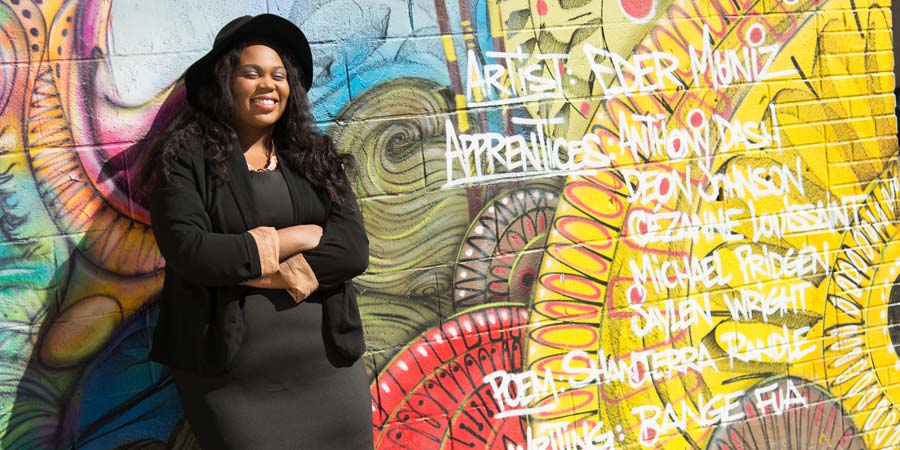Alumni Profile

Poetry Meets Empowerment
by Sofia Tokar
Poverty, violence, drugs — Shanterra Randle-Brown ’14 knows them well. Her father was absent during her childhood while her mother struggled with drug addiction (she has been drug-free now for 15 years). As a result, the Rochester, N.Y., native was raised by her grandparents on the city’s northeast side.
To cope, Randle-Brown began composing poetry. At 16, she performed her work at a peace conference. “As a teenager it’s incredibly humbling to speak and have people listen,” she says. “I realized that my poetry is not just for myself. It can be a testimony on behalf of the voiceless in my community.”
That performance crystallized Randle-Brown’s mission: Giving young people a voice while helping them to better themselves and their communities.
Art and activism have long been entwined for Randle-Brown. Before her first spoken-word performance, a youth worker from the Center for Teen Empowerment in Rochester asked her to join as a teen leader. She agreed.
Founded in 1992 in Boston, the center is a community-based youth organizing initiative that fosters leadership skills. Teen Empowerment (TE) opened its Rochester site in 2003. It annually hires approximately 10 to 20 area youth to develop community-building strategies around issues affecting them, including crime, unemployment, and education.
In Randle-Brown’s case, “TE encouraged me to use poetry to relay my message.” She continued honing her craft, eventually performing during 2008’s Slam High, a spoken word poetry competition. She and the Rochester team went on to place fourth in Def Poetry’s Brave New Voices, an international competition featured on HBO. “I learned to use my voice and experiences to inspire people to transcend negative stereotypes, statistics, and environments.”
While juggling work and art, a college education remained on Randle-Brown’s mind. In 2012, she transferred to Nazareth College to study adolescence education and history. Brian Bailey, Ph.D., professor of adolescence education, met Randle-Brown at one of TE’s annual luncheons, then saw her again at Slam High. One day she appeared in his class and announced her intention of becoming an inner-city schoolteacher.
“Shan adds a great dynamic to any classroom,” explains Bailey. “Because of her positive outlook and passion for social justice, people want to be around her.” Bailey believes that Randle-Brown’s life experiences have shaped her as a mentor and educator: “The youth at TE respect her because she’s real. Shan’s integrity and commitment to her students’ best interests set her apart.”
Randle-Brown, meanwhile, credits her professors with providing similar support. During her first semester at Nazareth, she learned she was pregnant. Determined to finish her degree on schedule, she returned to class one week after giving birth. “I couldn’t have done that without the help and understanding of my professors.”
Randle-Brown continues as TE’s program coordinator while working toward teacher certification. In January she returned to campus as the alumni keynote speaker for the annual MLK Day Celebration.
Her message? Reject injustice everywhere and stand by society’s marginalized people. “We cannot be complacent about the issues facing our city and our country,” she explains.
Whether she’s in Washington, D.C., meeting with the president’s chief officials as she was in March or in downtown Rochester counseling young people, Randle-Brown lives her message — and challenges others to do the same.
Sofia Tokar is a freelance writer in Rochester, New York.